|
Plough Lane/Roman Road
Upper Harbledown
https://whatpub.com/plough-inn
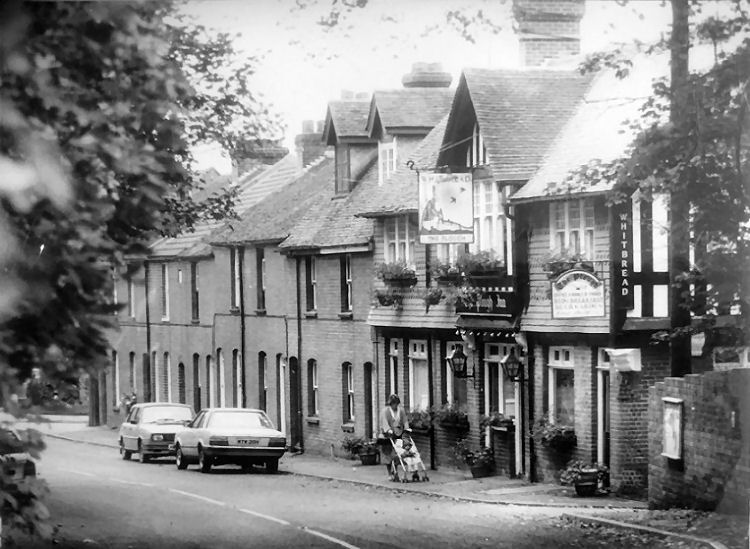
Above photo, 1980, kindly sent by Rory Kehoe. |
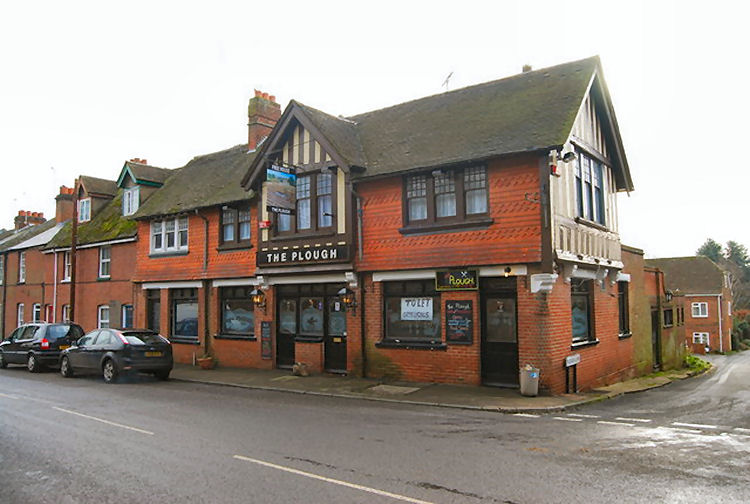
Plough at Upper Harbledown by Nigel Chadwick (Creative
Commons License)
|
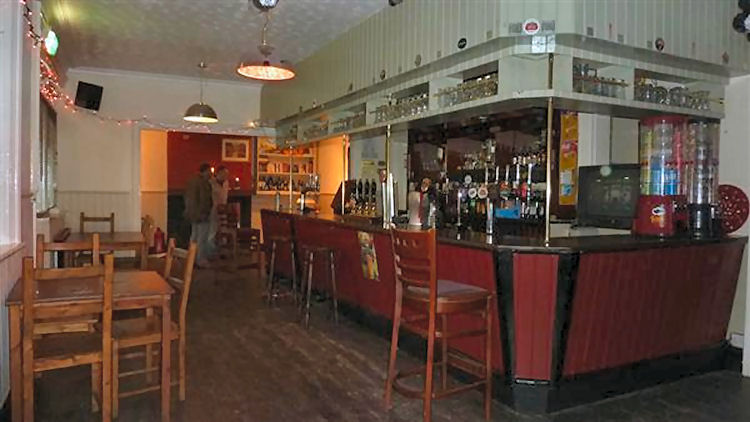
Above photo showing the bar area. 2011.
|
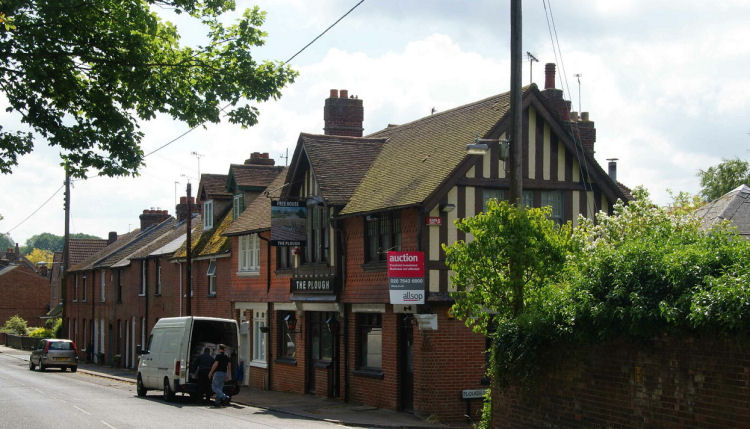
Above photo, circa 2012, kindly sent by Rory Kehoe. |
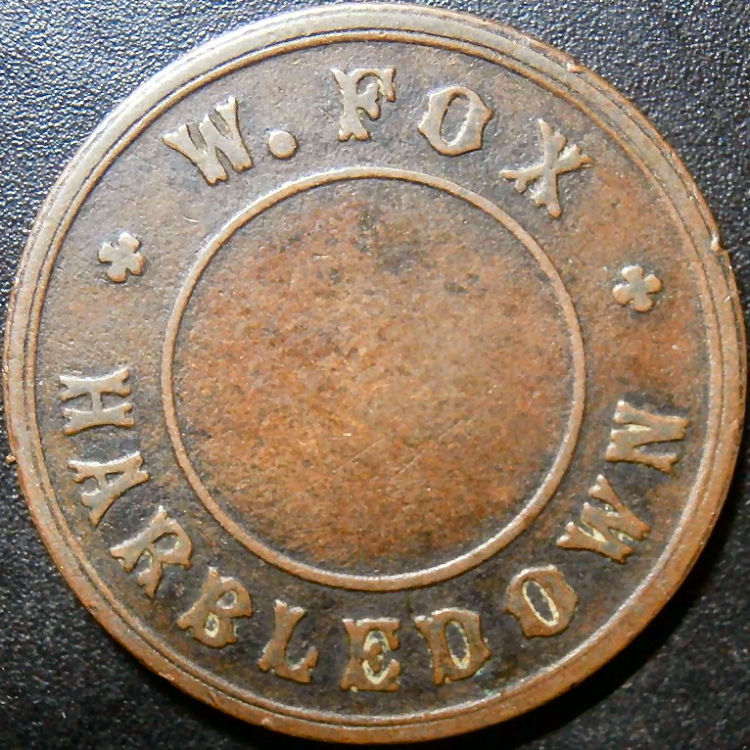
Above 1d token circa 1870, kindly sent by Rory Kehoe. |
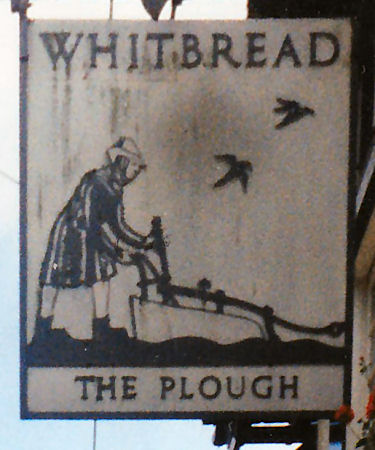 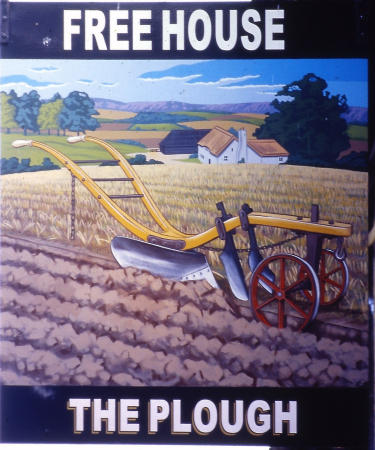
Above sign left, July 1986, sign right 2003.
With thanks from Roger Pester
www.innsignsociety.com. |
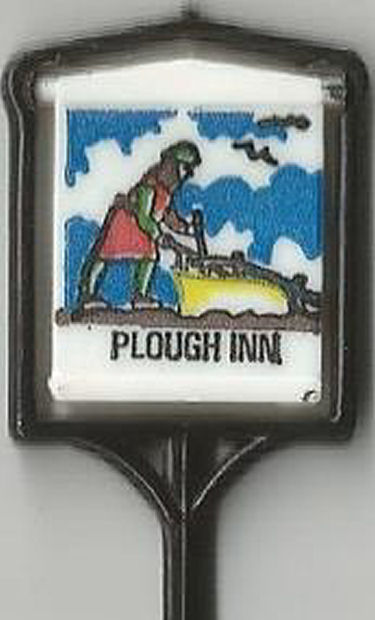 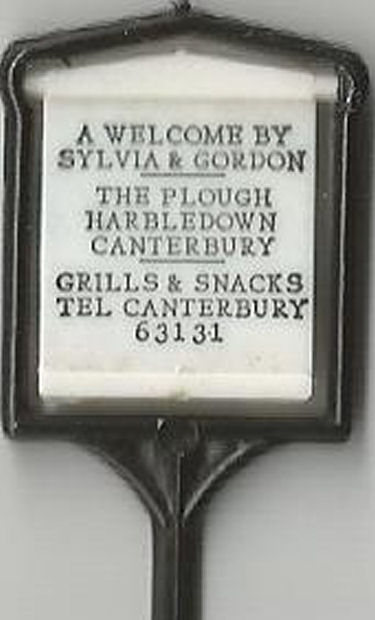
Above photos showing the top half of a cocktail stick from the 1960s,
kindly sent by Rory Kehoe. |

Above photo 2016, kindly sent by Rory Kehoe. |

Above photo 2016, kindly sent by Rory Kehoe. |

Above beer-mat 1982, kindly sent by Rory Kehoe. |

Above beer-mat 1982, kindly sent by Rory Kehoe. |
|
Kentish Gazette. Saturday 27 September 1777.
Wanted immediately. To pair of Sawyers.
Who understand cutting ship planx.
They have a Winter's Work by inquiring of George ???ols, at the "Plow,"
Harbledown, near Canterbury.
|
|
From the Kentish Weekly Post or Canterbury Journal 7 September 1819.
VALUABLE BREWERY,
Free Public Houses and other estates,
To be Sold By Auction, By Messrs. White, (Without Reserve).
Pursuant to certain orders of the Vice Chancellor of Great Britain, and
before the Major part of the Commissioners named and authorised in and
by a Commission of bankrupt awarded and issued against Matthew William
Sankey, of the City of Canterbury, brewer, dealer and chapman, at the
Guildhall, of the said city of Canterbury, on Wednesday next, the 22nd
day of September next, at eleven o'clock in the forenoon, (subject to
such conditions of sale as shall be then and there produced.)
The following very Valuable Freehold Estates, in Lots.
Valuable Brewery free public houses and other Estates to be sold by
auction by Mrs white without reserve.
Lot 17. A Messuage called the "Plough," with the Stable, yard, garden,
and appurtenances, situate in Harbledown, in the said County, and now in
the occupation of William Pilcher.
|
|
Kentish Gazette 14 April 1801.
Early yesterday morning some villains broke into the cellar of the
"Plough" public-house, at Harbledown, and stole thereout a quantity
of spirituous liquors to the value of £12.
|
|
Kent Gazette, 15 January 1839.
DEATHS.
Dec. 13, at Smith's Hospital, Longport, Canterbury. Mr. Pitcher, at an
advanced age, formerly landlord of the "Plough" public-house, Harbledown.
|
|
Kentish Gazette, 21 April 1857.
ST. AUGUSTINE’S PETTY SESSIONS. Saturday.
A Serious Mistake.
[Before E. Foss, T. H. Mackay, W. Delmar, and W. Slarke, Esqrs.]
John Bishop, stated to be a "watcher" of the river Stour, was had up
on a charge preferred by a young man named Frederick Andrews, whom
he assaulted in the violent manner detailed in our last. Complainant
appeared bandaged so much about the head and face, as to render it
almost impossible to take his statement, and therefore that of his
companion was at first taken.
Thomas Pearce, who deposed that he was a weaver, and that on Good
Friday night, about 10 o'clock, he and Andrews were proceeding
through Harbledown, on their road to Faversham to meet a sister of
Andrews, when at the top of "Wingate" hill, he said to Andrews,
"I’ll warm you" — meaning that he would give him a warming by
walking; on which defendant sprang upon them and said, "Will you
warm me?" witness replied "No — I was not speaking to you — we were
merely passing a joke between ourselves but disregarding this he
squared up and told them to come on if they wanted anything, and
knocked them both down. On regaining their legs they struck at him
in self defence, when defendant knocked Andrews down again and
kicked him while on the ground. Then in the scuffle both he
(witness) and defendant fell down. On rising he (witness) called to
Andrews, and as he could get no answer, and not knowing whether he
was dead or alive, he ran away calling "murder," defendant following
him, but whom he eluded; and when he returned in a quarter of an
hour he found Andrews was gone. He saw no more of him till next day,
when he found his jaw broken and his face very much swollen.
Defendant then offered to make it up, by paying half his doctor’s
bill, and allowing him 2s. a week till he was well — to which
Andrews declined to accede. No quarrel had previously taken place
between him and defendant, nor was he aware of any between him and
Andrews.
In cross-examination by defendant, witness denied that either he or
Andrews used an oath on seeing him, and told him to come on, nor did
they attack him first or his wife.
In reply to the bench he said he did not strike defendant till
after he had deposited some bread which he had on his shoulders.
Mr. A. B. Andrews, surgeon, who was called in to attend complainant
the next day, stated the condition in which he found him. from
severe blows that he had received — which had cut hit lip, knocked
out two teeth and loosened another which afterwards came out, and
caused a compound fracture of the lower jaw. The blows had evidently
been given with great violence; and he judged, from the skin outside
not being so much lacerated as inside, that the injury was not
caused by a kick.
The evidence of complainant was taken as well as it could be, which
was rather by gesticulations and nods than otherwise, in answer to
the interrogatories from the bench. It was to the effect of
substantiating that given by Pearce; and, in addition, that he
experienced the injury in the jaw from a kick while he lay on the
ground, and subsequently to receiving a blow in the face, from which
he experienced no particular injury. His teeth fell out after the
kick, he had no recollection afterwards till he found himself in bed
at the "Plough" public-house.
Defendant’s defence was to the purport that after he had left the
"Plough," with three gallons of bread on his shoulders, and other
things in his hand, the two pounced upon him, and whom he mistook
for footpads, and that the expression they used was intended to
apply to him — which led to the rencontre, in proof of which he
wanted to call his wife, but her evidence could not be taken. He
also attempted to explain away the compromise he had sought to
effect.
Pearce stated, in reply to the bench, that both he and Andrews had
had a little beer, but not to take any effect; and it was stated
against Bishopp that he had been drinking, and was quarrelsome when
at the "Plough," wanting to fight everybody.
The bench thought it too serious a case for them to decide, and
therefore committed him to the sessions for trial, but taking bail
for his appearance, which was at once produced.
|
|
From the Kentish Gazette, 30 June 1857.
ST. AUGUSTIN’E’S PETTY SESSIONS.
A TRANSGRESSING PUBLICAN AND HIS CUSTOMERS.
Saturday. [Before E. Foss, Esq., W. Hyder, Esq., and Capt. Slarke.]
Henry Bishop, of the "Plough" public-house, Harbledown, was had up
on a charge of allowing tippling in his house during the forbidden
hours and himself intoxicated.
Fined £2, and 11s. costs in each case — total, £5 2s., and told to
take care that he did not lose his license.
Sammers, the man who was tippling there, was fined 5s., and 9s.
costs., for payment of which a week was allowed him.
|
|
From the Kentish Gazette, 8 September 1857.
This was licensing day. All the renewals were granted and
applications for new licences by George Mackett, Herne Bay; William
Wood, Herne Bay; William Williams, Bridge; and William Wilson,
Bridge; were adjourned to this day three weeks.
The "White Horse," in Bridge, was transferred from Thomas Sherrard,
to James Hornsby; and the "Plough," Harbledown, from Henry Bishop,
to Thomas Sayer.
|
|
Whitstable Times and Herne Bay Herald, Saturday 16 January 1869.
Harbledown. Robbery From The Person On A Highway.
At the county magistrates' office, on Tuesday, before P. Martin, Esq.,
Thomas Baker, a rag and bone collector, of Canterbury, was charged with
having stolen about 30s. From the person of William Castle, at
Harbledown, on the previous evening.
It appears that the prosecutor and prisoner met at the "Plough" public
house, and the prosecutor having bought a rabbit there, the prisoner saw
that he possessed the quantity of silver. He followed him towards
Canterbury, overtook him, and we began hustling him about, under the
pretence of assisting him along the road. Presently the prisoner left,
and then the prosecutor missed his money. He was traced to Canterbury by
P.C. Page, K.C.C., and found at a public house in Military Road.
On charging him with the theft, he denied it, and said he had no money
about him.
The Constable proceeded to search in, which, by overcoming much
resistance, he succeeded in doing, and found upon him 27s.4 1/2d.,
principally in half crowns - the same kind of money that the prosecutor
lost.
Prisoner was remanded till Saturday.
|
|
From the Whitstable Times, 11 October, 1902.
HARBLEDOWN. REFUSING TO QUIT.
James Baker was charged with refusing to quit the “Plough Inn,”
Harbledown, on the 22nd September, when requested to do so by the
landlord, Thomas Norris.
Prisoner pleaded guilty.
There was another charge against prisoner, that of being drunk at Summer
Hill on the same date. He pleaded guilty to this charge also.
P.C. G. Neame stated the facts of the case.
The Bench fined defendant £1 and 9s. 6d. costs, or fourteen days' hard
labour in the first case, and 10s. and 8s. costs or seven days in the
second.
Prisoner was allowed a week in which to find the money.
|
|
Dover Express 16th August 1946.
ADISHAM.
Dennis Ellender (20) of 5 Station Road, Adisham, was seriously injured
on Saturday night in a head-on collision near the “Plough Inn”, Upper
Harbledown, near Canterbury, between his motor cycle and a motor van
driven by Mrs. M. A. Gurr of 19 Preston Road, Faversham. The force of the
impact catapulted Mr. Ellender from his machine through the windscreen
of the van. He was taken by ambulance to the Kent and Canterbury
Hospital with multiple head injuries and a fractured knee-cap. He is
reported to be making favourable progress. |
Situated in Upper Harbledown, the pub closed in 2011 and has been
converted into flats.
Following information kindly supplied by Rory Kehoe:- The lady named on
the beer-mat, Andree Collins, was the de facto manager of the Plough but the
actual tenant was her son, who lived in Cardiff and ran a couple of
nightclubs there. In around 1982, Andree had a major Pools win and if memory
serves, scooped c.£300,000 (around £2 million in 2021 value) Wealth may have
brought happiness but it also made Andree a target for criminals and about a
year after her win, she was robbed. Apart from being badly shaken up, Andree
was robbed of some of her jewellery. More trouble was to follow and in
around 1984, the Plough was firebombed. Nobody was badly hurt and the Fire
Brigade was able to save the Plough but in doing so, had to smash the pub's
windows, which included the last remaining example of one, advertising
"Ash's Canterbury Ales."
In later years, the Plough became a Thai restaurant and bar, a licensed
B&B and various forms of pub, none of which really caught the drinking
public's imagination. The subsequent combination of low turnover and
excessive PubCo rent did the rest, hence the Plough's failure, closure and
conversion to flats. Yet another dry village.
LICENSEE LIST
???OLS George 1777+
PILCHER William 1819+
WELLARD James 1832+

DUNKIN William 1838-51+
(age 48 in 1851 ) )

BISHOP Henry 1855-Sept/57
 
SAYER Thomas Sept/1857-62+ (age 51 in 1861 ) ) 
FOX William 1871+ (age 50 in 1871 ) )
HEARN Henry James 1878-91+ (age 56 in 1891 ) )

NORRIS Thomas 1901-11+ (age 45 in 1911 ) )
 
MILLER Maurice C 1938+

???? Sylvia & Gordon 1960s
COLLINS Andree 1982+
https://pubwiki.co.uk/Plough.shtml
 From the Pigot's Directory 1832-33-34 From the Pigot's Directory 1832-33-34
 From the Post Office Directory 1855 From the Post Office Directory 1855
 From Melville's Directory 1858 From Melville's Directory 1858
 From the Post Office Directory 1862 From the Post Office Directory 1862
 From the Post Office Directory 1882 From the Post Office Directory 1882
 From the Kelly's Directory 1903 From the Kelly's Directory 1903
 From the Post Office Directory 1938 From the Post Office Directory 1938
 Whitstable Times
and Herne Bay Herald Whitstable Times
and Herne Bay Herald
 Census Census
|












